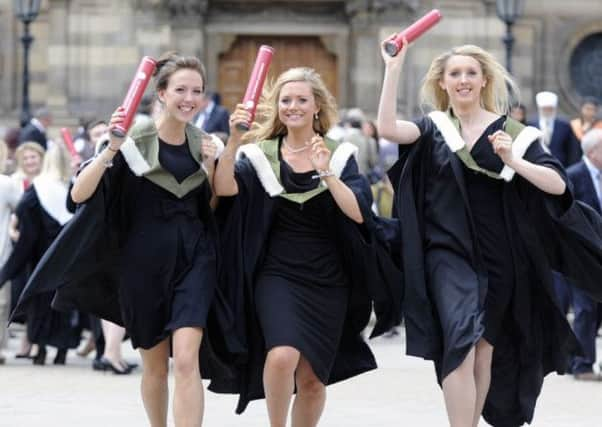Graduations at risk as lecturers threaten boycott


The University and College Union (UCU) said its members would use the “ultimate sanction” available to them if an ongoing pay wrangle is not resolved in the next two months.
Academics have already held a series of strikes in protest at a 1 per cent pay deal, which they say represents a 13 per cent cut in real terms since 2009.
Advertisement
Hide AdAdvertisement
Hide AdUCU, which has not enforced a marking boycott since 2006, said the Universities and Colleges Employers Association (UCEA) had so far failed to engage in serious negotiations, despite six strikes since October.
UCU general-secretary Sally Hunt said: “A marking boycott is the ultimate sanction, but an avoidable one if employers negotiate with us over pay. No member I have spoken to wishes to see this escalate, but in the continued absence of meaningful negotiations, we are left with no alternative.
“Even now, the timetable we have set provides a generous window of opportunity for the employers to address our just demands, which we, and students, hope they take. The strong support for our action so far demonstrates how angry staff are at the hypocrisy over pay in our universities. The employers cannot plead poverty when it comes to staff pay and then award enormous rises to a handful at the top.”
Last month, figures produced by the UCU showed that while staff have seen their pay fall in real terms, many in senior management have enjoyed double-digit raises.
According to the UCU figures, Professor Steve Chapman, principal of Heriot-Watt University, received a 24 per cent rise, accepting a £20,000 hike in salary and a £20,000 bonus to bring his overall package, excluding pensions contributions, to £210,000.Professor Dame Joan Stringer, outgoing principal of Edinburgh Napier, received an 11 per cent increase, while Professor Seamus McDaid, from the University of the West of Scotland, and Petra Wend, principal of Queen Margaret University, in Edinburgh, took an 8 per cent rise.
A UCEA spokesman said: “It is quite extraordinary for the UCU to be planning yet more action over last year’s pay uplifts with the 2014-15 pay negotiations due to start in March, a full month prior to the start of their threatened marking boycott.
“The employers were willing to explore whether both sides could engage in positive dialogue about how they could approach the 2014-15 pay round, rather than continue to dispute last year’s pay claim.
“Clearly HE institutions will be affirming their policies for withholding full pay for any staff who follow such a damaging course of industrial action.”
Advertisement
Hide AdAdvertisement
Hide AdGordon Maloney, president of the National Union of Students (NUS) in Scotland, said: “It’s important to remember that staff haven’t gone on strike in pursuit of grace-and-favour houses, lavish expenses or six-figure salaries, but instead in response to a measly offer of 1 per cent.
“Classes being cancelled and students not being allowed to graduate is a disgrace, but one that management and UCEA are responsible for. As long as universities keep nothing more than a derisory offer on the table they’re going to be failing students, and driving a wedge between them and the lecturers who are doing a great job teaching them for little reward.”